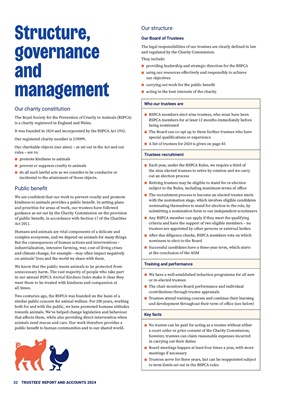
TRUSTEES' REPORT AND ACCOUNTS 2024
32
Structure,
governance
and
management
Our charity constitution
The Royal Society for the Prevention of Cruelty to Animals (RSPCA)
is a charity registered in England and Wales.
It was founded in 1824 and incorporated by the RSPCA Act 1932.
Our registered charity number is 219099.
Our charitable objects (our aims) - as set out in the Act and our
rules - are to:
• promote kindness to animals
• prevent or suppress cruelty to animals
• do all such lawful acts as we consider to be conducive or
incidental to the attainment of those objects.
Public benefit
We are confident that our work to prevent cruelty and promote
kindness to animals provides a public benefit. In setting plans
and priorities for areas of work, our trustees have followed
guidance as set out by the Charity Commission on the provision
of public benefit, in accordance with Section 17 of the Charities
Act 2011.
Humans and animals are vital components of a delicate and
complex ecosystem, and we depend on animals for many things.
But the consequences of human actions and interventions -
industrialisation, intensive farming, war, cost-of-living crises
and climate change, for example - may often impact negatively
on animals' lives and the world we share with them.
We know that the public wants animals to be protected from
unnecessary harm. The vast majority of people who take part
in our annual RSPCA Animal Kindness Index make it clear they
want them to be treated with kindness and compassion at
all times.
Two centuries ago, the RSPCA was founded on the basis of a
similar public concern for animal welfare. For 200 years, working
both for and with the public, we have promoted humane attitudes
towards animals. We've helped change legislation and behaviour
that affects them, while also providing direct intervention when
animals need rescue and care. Our work therefore provides a
public benefit to human communities and to our shared world.
Our structure
Our Board of Trustees
The legal responsibilities of our trustees are clearly defined in law
and regulated by the Charity Commission.
They include:
• providing leadership and strategic direction for the RSPCA
• using our resources effectively and responsibly to achieve
our objectives
• carrying out work for the public benefit
• acting in the best interests of the charity.
Who our trustees are
• RSPCA members elect nine trustees, who must have been
RSPCA members for at least 12 months immediately before
being nominated
• The Board can co-opt up to three further trustees who have
special qualifications or experience
• A list of trustees for 2024 is given on page 85
Trustees recruitment
• Each year, under the RSPCA Rules, we require a third of
the nine elected trustees to retire by rotation and we carry
out an election process
• Retiring trustees may be eligible to stand for re-election
subject to the Rules, including maximum terms of office
• The recruitment process to become an elected trustee starts
with the nomination stage, which involves eligible candidates
nominating themselves to stand for election to the role, by
submitting a nomination form to our independent scrutineers
• Any RSPCA member can apply if they meet the qualifying
criteria and have the support of two eligible members - no
trustees are appointed by other persons or external bodies
• After due diligence checks, RSPCA members vote on which
nominees to elect to the Board
• Successful candidates have a three-year term, which starts
at the conclusion of the AGM
Training and performance
• We have a well-established induction programme for all new
or re-elected trustees
• The chair monitors Board performance and individual
contributions through trustee appraisals
• Trustees attend training courses and continue their learning
and development throughout their term of office (see below)
Key facts
• No trustee can be paid for acting as a trustee without either
a court order or prior consent of the Charity Commission;
however, trustees can claim reasonable expenses incurred
in carrying out their duties
• Board meetings happen at least four times a year, with more
meetings if necessary
• Trustees serve for three years, but can be reappointed subject
to term limits set out in the RSPCA rules